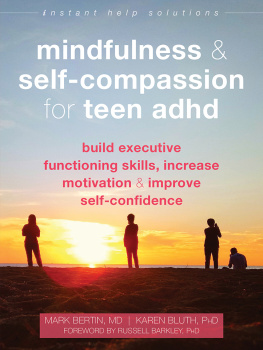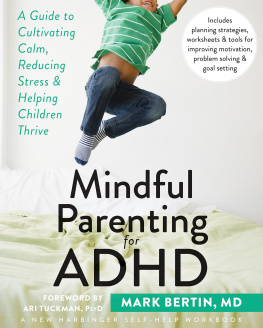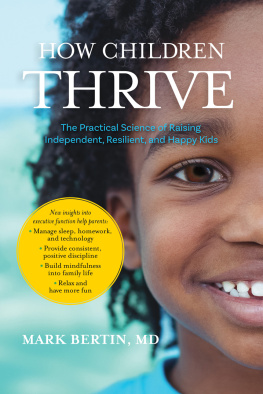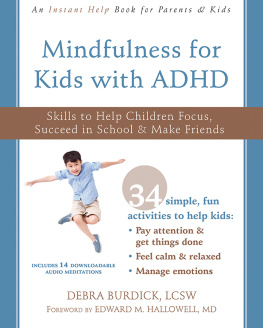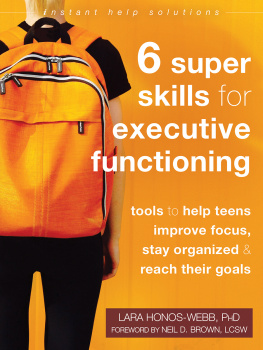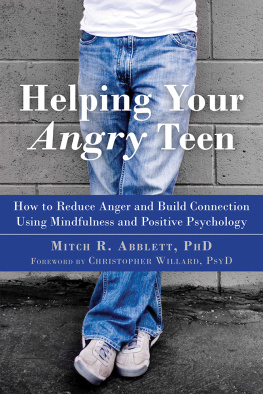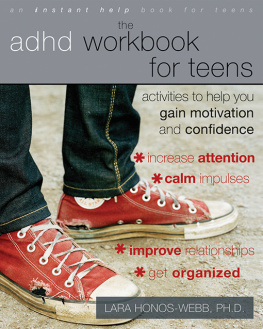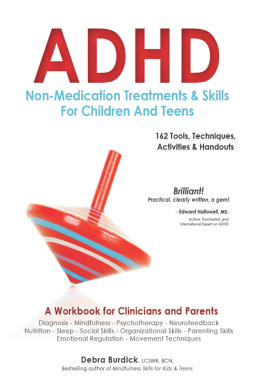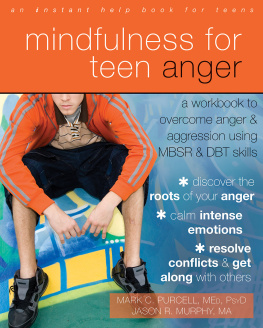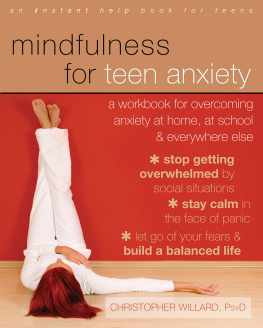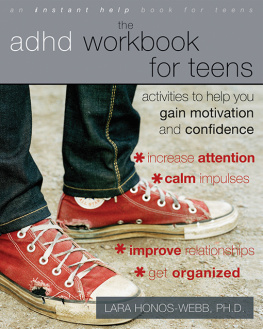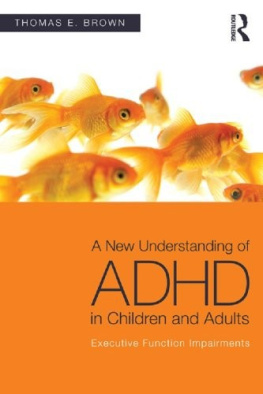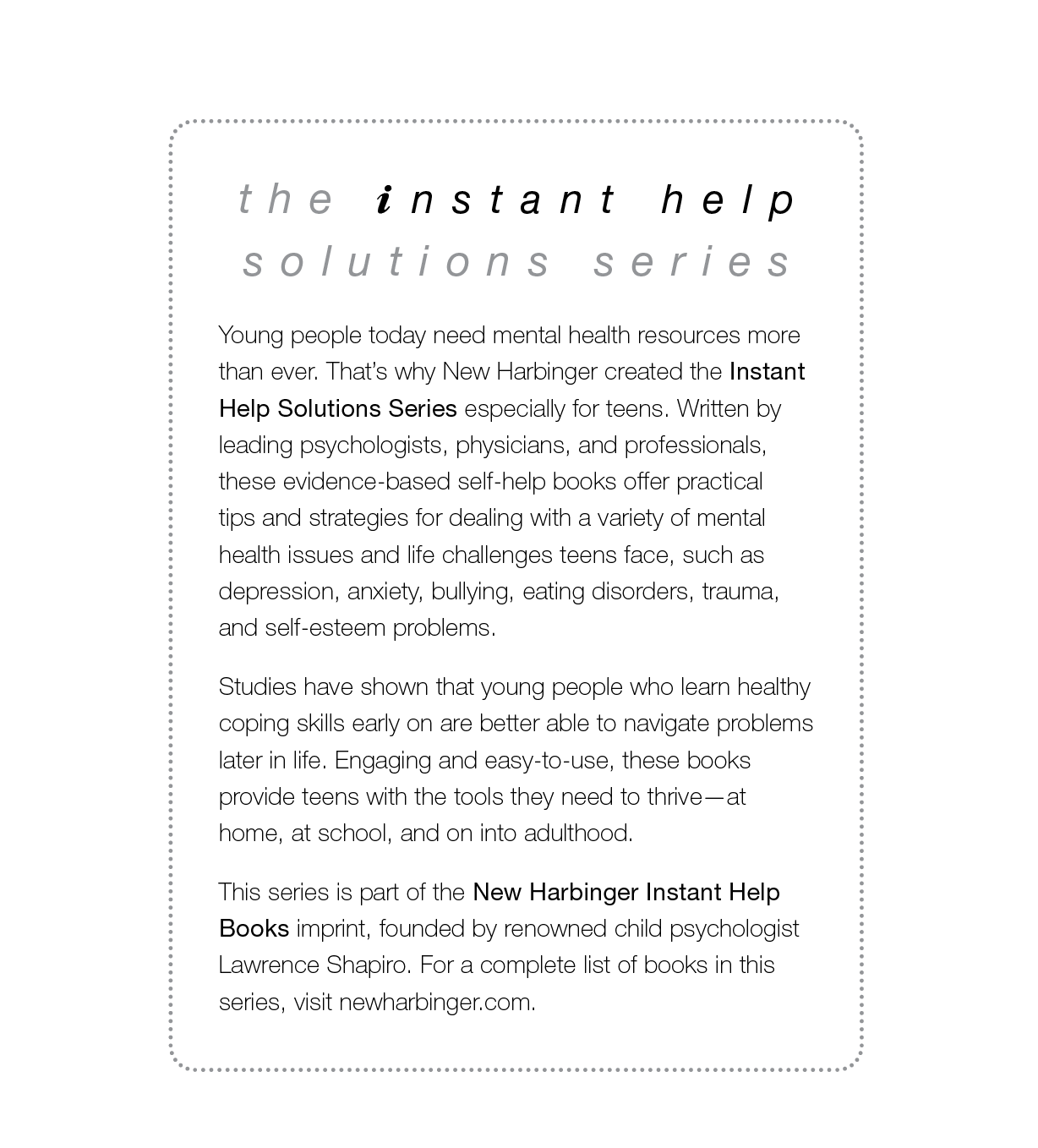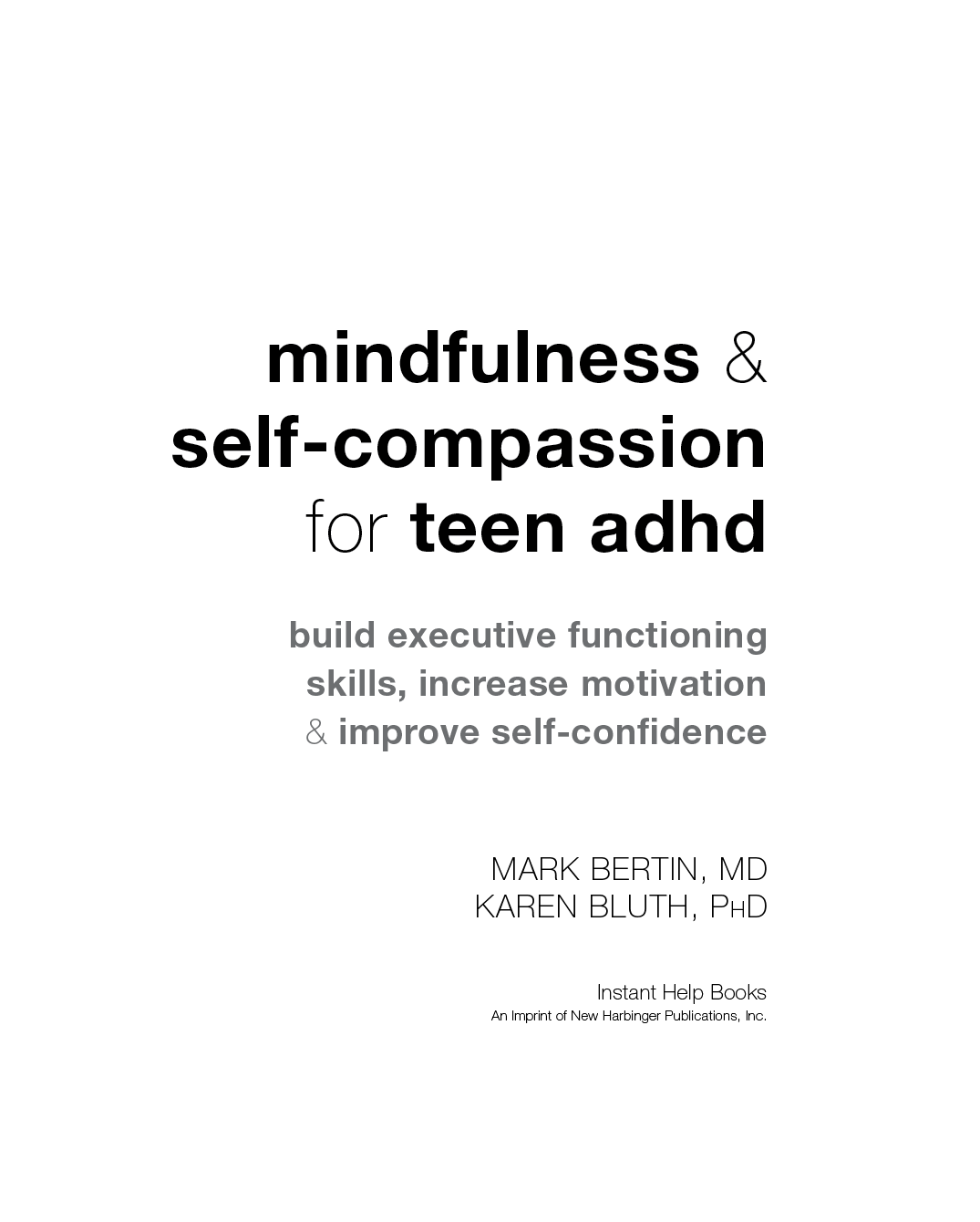This book is a treasure for any teen wanting to work more effectively with their ADHD. Using simple, easy-to-do, yet incredibly powerful exercises, young people will be able to use the resources of mindfulness and self-compassion to be calmer and more focused in daily life.
Kristin Neff, PhD , associate professor at The University of Texas at Austin
Mindfulness and self-compassion are a powerful formula for a happy and successful life. This book shows you easy ways to steady your mind, follow through on what you want to do, and quiet the critical voices in your head. Its written by experts who know their stuff, but its best to trust your own experience. Give mindfulness and self-compassion a try, and see what happens.
Christopher Germer, PhD , part-time lecturer in the department of psychiatry at Harvard Medical School, and coauthor of The Mindful Self-Compassion Workbook
This is a gentle and effective workbook packed with important and practical information for teens with ADHD. Bertin and Bluth capture the most essential ingredients in leading a successful life with ADHD: acceptance and self-compassion. This book achieves an alchemy of scientific-driven information and friendly accessibility so that teens can approach this guide with openness, in the effort of being their most authentic and optimal selves.
Roberto Olivardia, PhD , clinical psychologist and lecturer in the department of psychiatry at Harvard Medical School
Bertin and Bluth make mindfulness accessible, interesting, and even fun in their book, Mindfulness and Self-Compassion for Teen ADHD . It is written in a style that teens with ADHD can read thoroughly. The combination of Bertin and Bluths specializations make for an engaging book that covers the spectrum of teen experiences with ADHD. Their book is recommended for teens with ADHD, those that want to learn more about mindfulness, and clinicians who will appreciate this effective workbook.
Stephanie Moulton Sarkis, PhD , psychotherapist and author of Gaslighting (http://www.stephaniesarkis.com)
This great book shares a bunch of good strategies for staying on top of the practical matters of ADHD, but more importantly, it will help you to live a happier life where you get to call more of the shots. Some of those frustrating ADHD challenges will remain, but a mindful approach will help you keep your head on and bring your best to those challenges.
Ari Tuckman, PsyD , author, international speaker, and ADHD expert
Publishers Note
This publication is designed to provide accurate and authoritative information in regard to the subject matter covered. It is sold with the understanding that the publisher is not engaged in rendering psychological, financial, legal, or other professional services. If expert assistance or counseling is needed, the services of a competent professional should be sought.
INSTANT HELP, the Clock Logo, and NEW HARBINGER are trademarks of New Harbinger Publications, Inc.
Distributed in Canada by Raincoast Books
Copyright 2021 by Mark Bertin and Karen Bluth
Instant Help Books
An imprint of New Harbinger Publications, Inc.
5674 Shattuck Avenue
Oakland, CA 94609
www.newharbinger.com
Cover design by Amy Shoup; Illustrations by Elizabeth McGoldrick
Acquired by Tesilya Hanauer; Edited by Karen Schader
All Rights Reserved
Library of Congress Cataloging-in-Publication Data
Names: Bertin, Mark, (Psychologist) author. | Bluth, Karen, author.
Title: Mindfulness and self-compassion for teen ADHD : build executive functioning skills, increase motivation, and improve self-confidence / Mark Bertin and Karen Bluth.
Description: Oakland : New Harbinger Publications, 2021. | Series: Instant help solutions | Includes bibliographical references.
Identifiers: LCCN 2020048473 (print) | LCCN 2020048474 (ebook) | ISBN 9781684036394 (trade paperback) | ISBN 9781684036400 (pdf) | ISBN 9781684036417 (epub)
Subjects: LCSH: Self--Juvenile literature. | Compassion--Juvenile literature. | Mindfulness (Psychology)--Juvenile literature. | Attention-deficit hyperactivity disorder--Juvenile literature.
Classification: LCC BF697 .B4634 2021 (print) | LCC BF697 (ebook) | DDC 155.20835--dc23
LC record available at https://lccn.loc.gov/2020048473
LC ebook record available at https://lccn.loc.gov/2020048474
Contents
Foreword
It is with great pleasure that I welcome you to this helpful, sensitive, and thoughtful book about teens with ADHD written for teens with ADHD. Not only is ADHD in teens vastly understudied in research, but there are few trade books written on the topic. And most of those are written for parents of teens with ADHD, not for the teens directly. Yet the teens with ADHD with whom I have worked, and who have come to accept that they have this condition, often hunger for advice on how to cope with and succeed with itadvice thats written just for them and with their point of view in mind. This book strives to do just that; it provides direct assistance in easily understandable prose that may just change your life for the better.
Teens with ADHD struggle with a disorder that involves far more than just inattention or feeling restless or talking a lot. Underneath those surface problems are more serious ones that relate to self-regulation. For people to develop self-regulation and employ it effectively, they must develop their executive functionsthat set of mind tools that arise mainly from the prefrontal areas of the brain and the connections these areas have to other brain systems that they must govern. The executive networks of the brain are crucial for developing self-control, time management, planning and problem-solving, the skill of choosing appropriate goals and then attaining them, managing emotions, and self-motivation to support ones goals and welfare. In short, self-regulation is about anticipating and directing your behavior toward the impending future so that you can have a better future, and not just behave in ways aimed at the moment or now. The development of these mind tools of executive function is what ADHD disrupts. And it does so through no fault of your ownADHD is among the most genetically influenced and brain-based disorders known to mental health professionals. Yet even though you did not ask to have this disorder, or do anything wrong in developing it, it is ultimately your responsibility to deal with it.
That is because teens with untreated ADHD are not just prone to doing poorly at school and having more conflicts with their parents at home, they are also more likely to engage in risk-taking in many domains of lifeimpulsive behavior that can end badly, result in more risk for accidental injuries, and make them more than twice as likely to die from that risk-taking than is the case with typical teens. That risk-taking can also cause major problems for them when they are trying to become more independent of their parents, have more of a say in their lifes activities, make and keep new friends, and develop closer more intimate relationships with others. Having poor self-control can also create major problems for teens when they engage in driving a motor vehicle, learn about sex and engage in sexual relations with others, participate in sports without getting seriously injured, wisely manage the money they may start to earn through part or full time employment, and try to steer clear of the many opportunities they will encounter to experiment with unhealthy or illegal substances. This book is about how to cope with, make accommodations for, improve, and succeed with ADHD and its executive function deficits so that you can have a far better quality of life. Reading it may not only improve your life; it could just wind up saving it. That is why I am so glad you chose to open this cover and read this book. It is the first brick in building the path to the better life you know you deserve and can attain.

